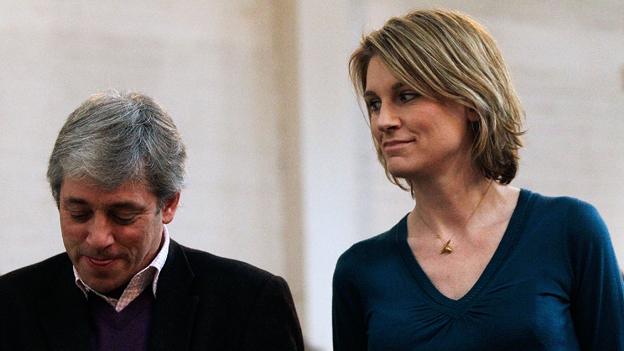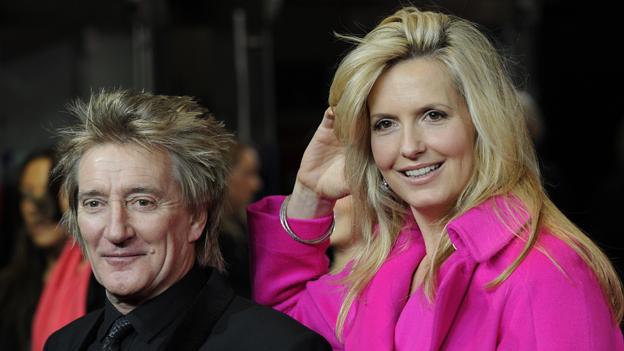A Point of View: Why short men make better husbands
- Published

Sophie Dahl has been repeatedly asked questions about her and her husband's height
Short men make better husbands, and make up in wisdom what they lack in stature, says self-confessed small man, Adam Gopnik.
Just a few weeks ago, an interesting and lengthy paper by a pair of sociologists from New York University made a lot of noise in what I suppose would these days be called the community of short men - a community to which, as it happens, I rather inarguably, one might say entirely, belong.
Its subject was what is called assortative mating - the way people divide themselves up, two by two in that ark-like fashion, for life. It was one of those wonderfully solemn sociological papers in which the utterly self-evident is systematically recast as the cautiously empirical.
The authors point out early on in their report that "social psychological research suggests that attractive people are favoured in numerous situations" (a thing you would not have guessed without social science) and soon after we learn that attractive and physically fit men report going on more dates and having sex more frequently than others.
But the conclusion of the paper, once one has weeded through, is striking and well documented. It is simply that short men make stable marriages. They do this in circumstances of difficulty and against the odds and consistently over ages and income groups, and they do it with the shorter women they often marry, but also with the taller women they sometimes land. Short men marry late but, once they do get married, tend to stay married longer and, by social science measures, at least - I assume this means they ask the short men's wives (I hope so anyway) - they stay happily married, too.
Many assertions about the assortative can be put forward to explain why this is so, but trust me, it is not hard to figure it out. There is a simple reason short men make stable marriages. It is because short men are desperate. Short men live in a world of taller men and know that any advantage seized is better kept. Desperation makes short men good husbands. We know the odds instinctively, and knowing that we have lucked out, intend to continue playing a good thing.
It is not, I should rush to add, that short men are desperate to please. One of the most interesting findings of the study is that short men actually do less housework in a typical marriage than tall men do - though the study points out delicately, this may be because with tall men, "the nature of their housework is different".
In other words, we are too short to reach the tops of closets where the heavy house cleaning equipment is kept. No, short men do not make stable marriages because they are desperate to please. It is because they are desperate to prevail.
An instinctive sense of the odds, born in schoolyards and playgrounds, tells the short man to redouble his efforts in every area of life - the office, the motorway, (God forbid) the golf course.
This is of course called the Napoleonic complex, but in truth it is not so much that short men become Napoleonic as that Napoleon was typically short - in his ambition, his drive, his uxorious devotion to his wife Josephine, whom he left only because he wanted to leave the French with a male heir. Hers was the last name on his lips, in the last sentences that he uttered, dreaming of that old stability.

How tall was Napoleon?

Contemporary accounts state that Bonaparte's height was 5ft 2in, but at that time, the French measured 13 inches to the foot (Napoleon himself oversaw France's conversion to the metric system). Given this discrepancy, Napoleon's height would have been 67 inches, or 5ft 7in in modern measurements - about the same height as the current French president, Francois Hollande, and taller than his predecessor, Nicolas Sarkozy.

There is, I think, a broader moral here. In every area of life, we underrate the merits of desperation, and persistently overrate the advantages of free choice. We insist that we ought to all be equal, free to make the choices we want and find the partners we need.
In fact, people who have this kind of freedom rarely use it well. Fashion models, free to choose, inevitably choose rock stars - and since rock stars, freed by their glamour to choose, invariably choose to take a lot of drugs and go on the road and smash up hotel rooms in preference to being in a stable relationship, the models are always badly disappointed by their choice. You see them crying on the shoulders of the short men - dipping their long swan-like necks way down to do so, perhaps, but there you are, they do. Frequent failure is the true price of free choice.

Speaker of the House of Commons, John Bercow, and his wife Sally
If we look up - or rather down, even below the knees of the short, to the ground itself, we find this same truth embodied as an economic principle, where it is called the curse of resources. Countries with vast natural resources, such as oil and copper and gold, tend to do less well economically than countries that have none - the short people countries, in other words. This is because resources, easily found, are easily squandered.
Countries and city-states with few or no resources - the short lands, one might call them - must rely on their ingenuity and effort, as Singapore and Switzerland do. They end up being more productive despite - indeed, because - they have so much less to work with. They have made, so to speak, stable marriages with the planet.

AC/DC's Angus Young
Well, what of short rock stars? I have been hearing you asking that question for the past two paragraphs. Don't they make unstable supermodel marriages? Isn't it really a question more of status than simple stature?
Well, first of all - are there short rock stars? An online list of short rock stars turns up people like Angus Young of AC/DC and Flea - but surely these are 2nd or 3rd XI rock stars? A rock star nicknamed Sting is a rock star. A rock star nicknamed Flea is not really a rock star. Angus Young, yes, is certainly a star - but a rock star of a very self-consciously short kind, famous, as we all know, for wearing schoolboy outfits onstage.
In this way indeed, short men (including short rock stars) in their desperation, shrewdly piggyback on one of the few human predispositions that I think can actually be called hardwired - what we might call the neotenic illusion.
By this I mean our readiness to think that anything that has the short stature and plump cheeks and rounded body of a human baby must actually be like a human baby. If we did not think babies were hopelessly cute, after all, we would kill them for being so exhausting.
And so panda bears and chipmunks, and short men too, have smuggled their way into our affections through the same cognitive door that was meant to open only for the infants. A typical penguin is as full of rage, violence and dignity as a tiger but they resemble our young, and so are pinned as adorable. They are classified as cute, as short men are, too.

Full of rage, violence and dignity
But there is another, more easily overlooked truth that short people know that resource-short countries don't. The concept of shortness among men at least is surprisingly elastic. There is a period in the life of a short man - between his early adolescent unhappiness at being short, and his later awakening to the miracle of having achieved so much despite it - when his own shortness becomes invisible to him.
With our suits hemmed and altered, the waist cinched in by a painfully sympathetic tailor, we give the same appearance, in a mirror at least, with no comparison (I almost wrote "no competition") around, of being about the same as anyone else.
For the prime of a short man's life - Napoleon is the model here again - his shortness is not thematised at all. On horseback in the paintings by David or the Baron Gros, or enthroned by Ingres, Napoleon may look moon-faced, and the little ringlet that dangles above his eye may seem dandyish, but the last thing he looks is short.
It is only later on Elba and St Helena that his diminutive stature becomes part of his self-knowledge. The true Napoleonic moment is when age and circumstances conspire to remind the short man of his stature. It was when the emperor had lost the last battle that the truth returned. I am no longer an emperor. I am merely a short man on a lonely island.

Rod Stewart and Penny Lancaster
So, short men learn early this essential truth - that long odds make for good lives. A man's mate should exceed his height, not to mention his little grasp, or what's a heaven for?
It is not an accident, I think, that the great periods of civilisation tend to follow on and then appear not in moments of abundance alone, but of renewed relief.
They come shortly after some disaster that has given an entire community the same sense of having made it by the skin of their teeth that a short man feels, looking gratefully at his wife in the early morning.
Renaissance Florence appeared in the wake of the black plague that halved its population. The Paris we love most, that of the impressionists and the Belle Epoque, rose with the smouldering ruins of the Franco-Prussian war still visible in its centre.
They were reduced - shortened, one might even say - but they clung to pleasure. Entitlement and its disappointments make wars. Desperation and gratitude build cities.
Subscribe to the BBC News Magazine's email newsletter to get articles sent to your inbox.
Are you taller than your husband or shorter than your wife?